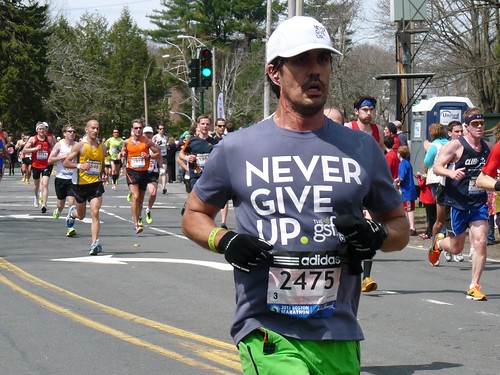I recently finished reading Haruki Murakami’s What I Talk About When I Talk About Running. Murakami is a novelist who is also a distance runner, and I adored the New Yorker essay he wrote in the weeks after the Boston Marathon bombings. I’m familiar with the Boston Marathon as a spectator, not a runner, so it was fascinating to read Murakami’s memoir of running marathons in Boston, New York, Athens, and Hawaii, as well as his training regime and day-to-day running practice.
I’m not a long-distance runner, or a runner of any distance. Instead, I’m a pudgy middle-aged woman with asthma who walks a lot but can’t run: a thoroughgoing pedestrian. But what Murakami talks about when he talks about running isn’t just running: he talks instead about endurance, perseverance, and downright stubbornness, the refusal to give up when one’s entire body is screaming STOP. Murakami could be talking about running or open-water swimming or mountain-climbing or sitting cross-legged on a Zen retreat: any endeavor that pushes you far beyond a place of comfort, where your own desire to continue to the finish is the only thing keeping you from stopping.
At a retreat of first-year writing instructors at Framingham State last month, one of my colleagues used the word “endurance” to describe one of the intellectual skills we want to instill in our students. We weren’t talking about anything as physically taxing as running a marathon; instead, we were talking about reading. Unpracticed readers falter or give up when they face a text that is long or challenging; they let the reading outlast them, like a long road. What both academics and athletes know is that you can’t give up when the way gets long or difficult. Continuing through the discouragement, discomfort, and doubt is what you train yourself to do. When you think about running and intellectual work this way, they end up having a lot in common. What’s important in each case is the endurance you cultivate. It almost doesn’t matter what you do as long as it takes you to a place of will-breaking discomfort, and you continue doing it anyway.
Murakami compares marathon running to novel-writing: two seemingly impossible tasks that many people dream of doing, and that you actually accomplish through sheer perseverance, letting one footstep or word follow the next. Both marathons and novels are finished through a long haul. Anyone can start to run a marathon or write a novel, but finishing is the true challenge. Murakami suggests that marathon-running is essentially a mental rather than physical endeavor, a paradoxical claim since the whole of your existence while running is reduced to purely physical concerns: the thirst in your throat, the pain in your shins, the sweat on your back, or the cramps in your legs.
What I Talk About When I Talk About Running corroborates my suspicion that when you’re running, great existential concerns are subsumed by purely physical ones. Ironically, though, when you’re running, it is the mind that ultimately determines whether the body will continue. Murakami’s memoir reminded me of a passage in Robert Pirsig’s Zen and the Art of Motorcycle Maintenance where the narrator describes his inability to climb a holy mountain in India while older, pudgier, and more reverent pilgrims successfully attain the summit. The pilgrims who succeeded didn’t climb the mountain through sheer force of strength but through reverent submission to the suffering the climb caused. Their bodies might have been weak, but their spirit was strong, with every step being a kind of sacrifice.
Today was the Boston Marathon Jimmy Fund Walk, an annual fundraiser to raise money for cancer research. The walk follows the route of the Boston Marathon, and many folks who would never claim to be distance runners or even athletes nevertheless commit to walk the entire way from Hopkinton to Boston in order to raise money for a good cause. Reading Murakami’s account of running marathons, triathlons, and even an ultramarathon confirms that I don’t have the soul, will, or knees of a distance runner…but walking long distances, reading long texts, and writing, writing, writing seems attainable. The end of Murakami’s memoir came quickly and comfortably: you don’t have to have endless endurance to read his book. If I ever commit to walk a marathon—something I’d like to do, someday—I’ll keep Murakami and his insights in mind, from beginning to end.
Today’s photos come from this year’s Boston Marathon, before heartbreak happened.






Sep 9, 2013 at 4:45 am
Hello,
I thought you and perhaps your readers might be interested in my new collection of poems
KNOWING THROUGH POETIC REFLECTION
ISBN 978-1-78003-617-5
Pen Press, UK.
Available from Amazon or bookstores.
Readers may enjoy poems of a therapeutic nature assisting with cancer treatment.
There are spiritual themes too about reflection, prophecy, and wisdom.
More academic readers may like the chapters on poetry as knowing, and poetry as a process and product of research
Best wishes,
Brian
Teacher educator
Research mentor
LikeLike